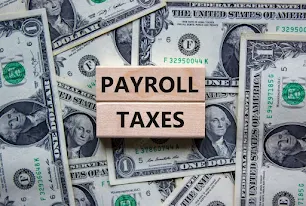What is Payroll Tax ?
Purpose of Payroll Tax
- Funding Social Security: Payroll taxes contribute to the financing of Social Security benefits, including retirement, disability, and survivor benefits for eligible individuals.
- Supporting Medicare: Payroll taxes help fund the Medicare program, which provides healthcare benefits to eligible individuals, primarily those aged 65 and older.
- Maintaining Unemployment Insurance: Some payroll taxes go towards funding state unemployment insurance programs, which provide temporary financial assistance to eligible workers who have lost their jobs.
- Ensuring Program Sustainability: Payroll taxes play a crucial role in ensuring the long-term sustainability of Social Security, Medicare, and other related programs by providing a dedicated source of revenue.
- Redistributing Wealth: Payroll taxes often operate as a form of wealth redistribution, with higher-income earners contributing more in absolute terms while receiving benefits based on a capped income threshold.
- Promoting Social Welfare: The revenue generated from payroll taxes supports essential social welfare programs that aim to provide financial security and healthcare services to individuals and families in need.
How Much is Payroll Tax ?
Who Pays Payroll Taxes ?
How to Pay Payroll Tax ?
- Calculate the amount of payroll taxes owed, including both employer and employee portions.
- Withhold the employee portion of payroll taxes from each employee's paycheck based on their earnings.
- Deposit the withheld payroll taxes, along with the employer's portion, to the appropriate tax authorities.
- File payroll tax returns with the relevant tax authorities on time, typically quarterly for federal taxes and annually for state and local taxes.
- Maintain detailed records of payroll transactions, tax calculations, and tax filings to ensure compliance.
- Consider seeking professional assistance or using payroll software to streamline the process and ensure accuracy.
What are the Consequences of Not Paying Payroll Tax ?
- Legal penalties such as fines, interest charges, and potential criminal charges.
- IRS enforcement actions, including placing liens on business assets or seizing property.
- Potential personal liability for business owners or responsible parties.
- Impact on employees, including delays or disruptions in receiving benefits.
- Damage to the business's reputation and credibility, affecting relationships with customers and employees.
Advantages of Payroll Tax
- Stable Revenue Source: Payroll taxes can provide a stable source of revenue for government programs, such as Social Security and Medicare, as they are collected regularly with each paycheck.
- Simplicity: Payroll taxes are relatively straightforward to administer since they are calculated as a percentage of an employee's wages, often with predefined caps.
- Specific Funding: Payroll taxes are often earmarked for specific programs, such as retirement benefits or healthcare, ensuring that funds are dedicated to their intended purposes.
- Shared Responsibility: Both employers and employees contribute to payroll taxes, distributing the burden across the workforce and businesses.
Disadvantages of Payroll Tax
- Regressive Nature: Payroll taxes can be regressive, disproportionately impacting lower-income workers since they are often imposed at a flat rate up to a certain income threshold.
- Impact on Employment Costs: For employers, payroll taxes increase the overall cost of employing workers, potentially leading to reduced hiring or lower wages to offset the tax burden.
- Limited Deductions: Unlike income taxes, payroll taxes do not offer deductions or credits based on individual circumstances, which can be disadvantageous for certain taxpayers.
- Dependency on Economic Conditions: Payroll tax revenue can fluctuate with changes in employment levels and wages, making it less predictable during economic downturns.
Payroll Tax vs Income Tax
|
Aspect |
Payroll Tax |
Income Tax |
|
Definition |
Taxes paid on wages and salaries by employers and employees. |
Taxes paid on individual or business income. |
|
Purpose |
Funds programs like Social Security, Medicare, and unemployment
benefits. |
Funds government operations and services. |
|
Who Pays |
Both employers and employees contribute. |
Individuals and businesses pay based on income levels. |
|
Calculation |
Calculated as a percentage of an employee's wages, often with caps. |
Calculated based on taxable income after deductions and credits. |
|
Components |
Includes Social Security tax, Medicare tax, and sometimes
state-specific taxes like unemployment insurance. |
Includes federal, state, and local income taxes. |
|
Timing |
Paid regularly with each payroll cycle. |
Typically paid periodically throughout the year, often annually or
quarterly. |
|
Responsibility |
Employers are responsible for withholding and remitting payroll taxes. |
Individuals and businesses are responsible for calculating and paying
income taxes. |
|
Reporting |
Reported on payroll tax returns, such as Form 941 for federal taxes. |
Reported on income tax returns, such as Form 1040 for individuals or
various forms for businesses. |
|
Examples |
Social Security tax (FICA), Medicare tax, Federal Unemployment Tax Act
(FUTA). |
Federal income tax, state income tax, local income tax (where
applicable). |
